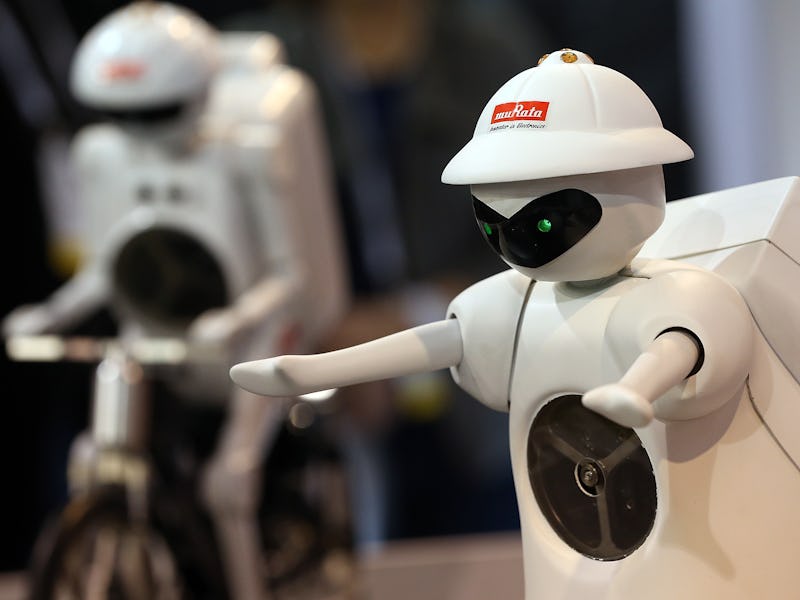Only the Worst Parents Ever Would Get Their Kids a Robot Babysitter
Even in the future, sitting babies will be tough for 'bots.

My sister babysits four different kids under age 6 each week. If some companies had their way, she’d be a robot.
More and more technology is being introduced that seeks to eventually replace human babysitters, like this $6,000 Hello Kitty robot with fully functioning arms, legs, and head that debuted in 2007. It can talk to your child in three different personality modes, and features facial and vocal recognition software that allows it to remember your child for the next time they have a little kid/robot chat.
The Japanese retailer Aeon Co. has developed robots to specifically watch after children while their parents shop at its stores. The 4.5-foot bot recognizes children via special QR code badges worn by each child, and uses a limited vocabulary to play with the kids while mom and dad buy up all that sweet, sweet Aeon merchandise.
Are robo-sitters the future of raising/ignoring kids? The benefits are obvious, if the technology can keep pace. Not only would they alleviate some of the basic stresses of parenting, they also offer some tantalizing upsides. Imagine a babysitter who can’t raid a fridge, make out on a couch, order a premium movie, sample your liquor, or text even once during a shift.
But we all saw what a stiff that Robo-Cop was. Would robo-sitters fare any better at offering tenderness, love, care, all that yadda-yadda?
I asked my sister to justify her existence in the face of the onrushing robot revolution. She said technology is already a vital part of watching kids. “Both families of the kids I watch have iPads that are used for games, which keeps them occupied especially if I’m making dinner or feeding one of them,” she said. “One of the families had a monitor in the baby’s room that I could view on an iPad, and I’d check it every so often to make sure the baby was asleep.”
There’s a long leap between using iPads as baby monitors and having full-on robot wet nurses. To my sister, and probably most parents, that kind of robo-sitter is still a sci-fi hypothetical.
“I don’t think a robot or some other technology could legitimately replace and do the job of a babysitter,” she said. “Robots can’t comfort a crying or colicky child because the baby’s needs are constantly changing, and I don’t think a robot would be versatile enough to identify problems and act accordingly.”
Kids are tiny, volatile weather systems. Their behavior and health change constantly. Even the T-800 of babysitters would only plausibly be able to take care of the easiest of kids, tops. Even in those simplest of cases, robotic nannies would opens up a whole new realm of child psychology. My sister, who’s getting her master’s in mental health counseling, says even some extraordinary far-off robot will be challenged to offer the fundamental human interactions that babies dig.
“Robots don’t have the love and empathy children need during critical periods of development,” she said. “Children need constant human contact in order to grow, learn, and develop and I wonder if a robot would be able to do that.” They can’t simply replace the je ne sais quoi of the human element inherent in childcare. A robot would negate fundamental parts of any healthy growing child as well, or they’d seriously screw the kid up in the process.
So will we press a button to summon a robot to take care of our kids? Not anytime soon, or in the near future — not if you’re a decent parent, anyway. Stories of robots that take care of your kids are quick news hits or a brief swell of exposure for companies ambitious (read: hubristic) enough to claim they have a robot that can watch kids. Sitting takes more than a camera, a bank of voice commands, and facial recognition software. Call me when a robot learns to make popcorn, braids hair, tells a decent knock-knock joke, and does rad voices while reading The Lorax.